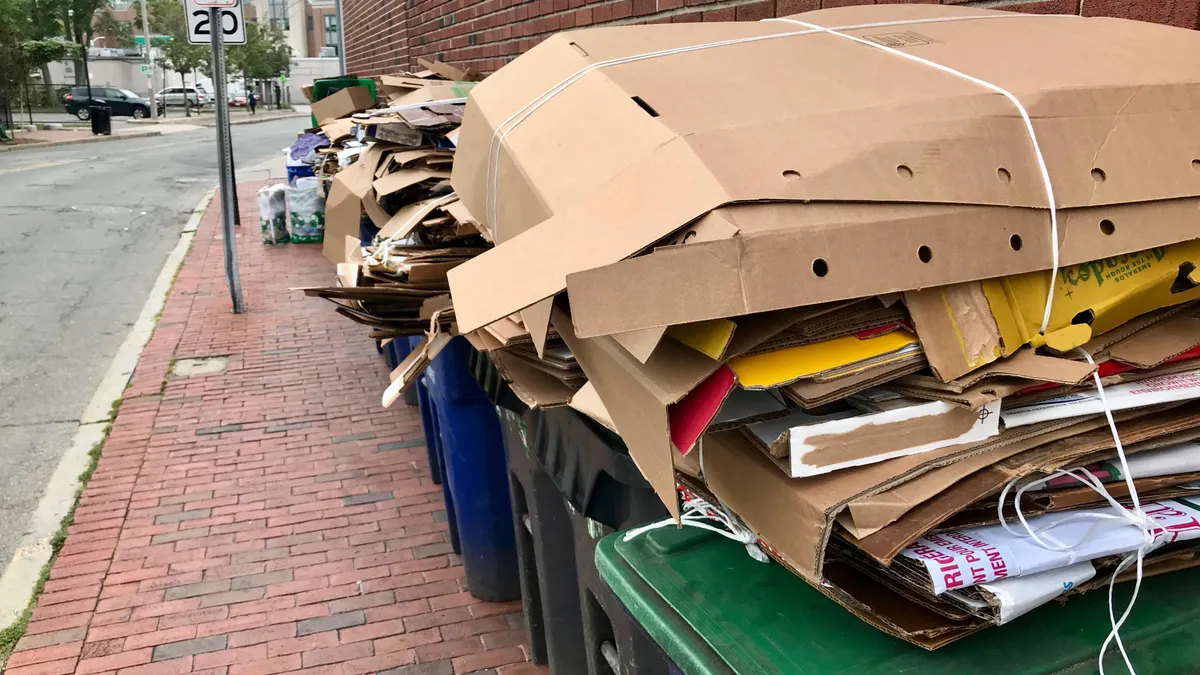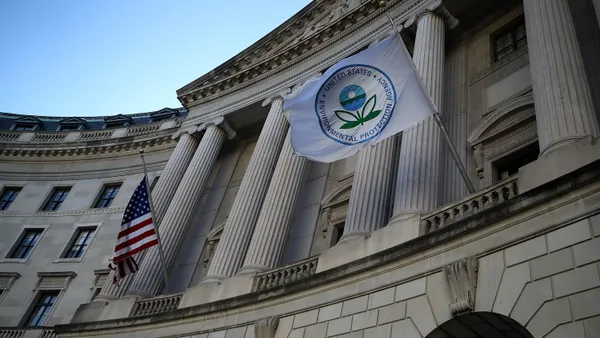Initial financial effects of the coronavirus pandemic began showing up in Q1 earnings reports this spring, but Q2 reports were more telling as they included a full stretch of months with significant economic effects. Catch up on the latest results and perspectives from Waste Management, Republic Services, Waste Connections, GFL Environmental, Covanta, Advanced Disposal Services and Casella Waste Systems below.
Q2 Earnings
| Revenue |
$3.56B |
| Year-Over-Year Change |
9.87%▼ |
| Net Income |
$307M |
- The industry's largest player saw a $400 million revenue hit and double digit volume declines across most categories except residential, but offered multiple signs for further optimism that the worst economic effects might be behind it. Activity began ticking back up in June across several areas and customer cancellation rates have not been as bad as anticipated.
- Contrary to some expectations, Waste Management executives reported business has largely been strong in states seeing coronavirus case surges such as Texas, Arizona and Georgia. Areas that were closed for the longest, such as the Northeast, have been slower to recover but are now beginning to rebound in terms of customer activity.
- Capital expenditures were down $142 million year-over-year, largely due to slower landfill cell construction and fewer steel container purchases. While fleet spending will not be affected this year, it could shift next year depending on volume trends.
- 2020 projections: Waste Management now anticipates annual revenues will be down 4-5%, with negative effects persisting into Q3 and possibly tapering off from there. CEO Jim Fish didn't expect to return to a state of normalcy that would allow for direct comparisons to 2019 until mid-2021 or possibly Q1 of 2022.
Q2 Earnings
| Revenue |
$2.454B |
| Year-Over-Year Change |
5.79%▼ |
| Net Income |
$225.5M |
- Republic reported revenue and volume declines during the second quarter, as anticipated, but saw positive results on multiple fronts that executives said were a sign of resilience. July revenue levels were up 1.5% from June and pricing growth has remained steady, according to the company's earnings call.
- Overall volumes were down 7.4% in Q2, improving from a 10.2% decline in April to a 5.4% decline in June. Economic activity is slowly resuming in multiple regions so these numbers could sequentially improve. Residential volumes were up 10.1% year-over-year, but those levels moderated to 7.6% above 2019 levels in June.
- Recycling revenue rose to $73.5 million in Q2, up from $71.9 million in 2019, but a substantial increase in commodity values was offset by an 11% decline in inbound volumes. E&P revenue was down 26% year-over-year to $30.1 million due to decreased drilling activity and other factors expected to continue through the year.
- 2020 projections: Republic set new guidance of $1.1 billion to $1.175 billion in adjusted free cash flow for 2020, close to its pre-pandemic target. The company also projected upward of $650 million in M&A spending for the year, largely driven by the pending Santek Waste Services deal, and has completed $124 million in other acquisitions to date.
Q2 Earnings
| Revenue |
$1.306B |
| Year-Over-Year Change |
4.67%▼ |
| Net Loss |
$227.1M |
- Waste Connections reported second quarter results skewed by ongoing E&P headwinds, but saw revenue come in $18 million better than projected as economic activity has regained momentum. As of July, 60% of the commercial solid waste accounts that suspended or reduced service have been in touch to resume. This covers 50% of affected revenues.
- E&P revenue was down 43% year-over-year, due in part to pandemic effects on an already weakening energy market. Recognizing these trends, the company recorded a $417.4 million impairment charge relating to assets in the Bakken, Eagle Ford and Powder River basins. During the earnings call, CEO Worthing Jackman said this was a uniquely low period for the sector, but "it’s been a great business and it will be a great business."
- The company's M&A plans have continued largely unaffected, aside from logistics and timing. Waste Connections reported completing deals worth $60 million in annual revenue across nine states. Another deal worth $40 million is expected to close in Q4, with the possibility of more to come.
- 2020 projections: Waste Connections released the most detailed guidance updates of any in the sector, now estimating Q3 revenue will be $1.37 billion and volumes will be down by 7-7.5%. For 2020, revenue is now projected to be $5.325 billion, annual net income is projected to come in at $184 million, and adjusted free cash flow is projected in the $805 million to $835 million range.
All financial information in Canadian dollars
Q2 Earnings
| Revenue |
$993.3M |
| Year-Over-Year Change |
19.5%▲ |
| Net Loss |
$115.5M |
- GFL reported its highest revenue ever in Q2, largely driven by growth from prior acquisitions, and said pandemic effects have been less severe than expected. While the virus contributed to a 4.3% decline in organic growth for the company's solid waste business during the quarter, this was better than the 8.7% decline seen in April.
- The company's overall volumes were down 8.3% for the quarter, 80% of which was driven by depressed industrial, commercial and institutional activity. Effects were particularly notable in Canadian cities Montreal, Toronto and Vancouver, whereas much of the company's U.S. business was less affected.
- While GFL reported $2.5 million in pandemic-related costs, this was offset by an estimated $9 million in savings on overtime, fuel and other operating expenses. A more positive outlook has led to higher than projected capital expenditures, following an initial $100 million pause in the spring.
- 2020 projections: GFL did not offer updated annual guidance, but based on sequential improvements through July, the company anticipated positive trends could continue assuming future shutdowns do not occur. During the earnings call, CEO Patrick Dovigi predicted another "outsized" year of M&A with deals worth an estimated $80 million in revenue nearing final stages. The company's acquisition of divestiture assets from Waste Management and Advanced Disposal Services also recently grew to an $863.5 million deal.
Covanta
Q2 Earnings
| Revenue |
$454M |
| Year-Over-Year Change |
2.78%▼ |
| Net Loss |
$13M |
- Like its peers, Covanta experienced Q2 revenue declines, particularly in the areas of profile waste and commercial MSW, along with lower commodity market prices. CEO Steve Jones said during an earnings call that activity had already begun to tick back up in June and the company has now ended some cost saving measures such as salary reductions and furloughs. "These are solid results considering the environment we are in, and a clear indication of the underlying resiliency of our business model," said Jones.
- Covanta responded to declines in commercial and industrial waste by temporarily sourcing replacement volumes of spot MSW from transfer stations and new customers. Prices bottomed in April and improved slightly in May, before a "more meaningful" increase in June when tip fee prices were higher year-over-year, Jones said. As manufacturing ramps back up, Covanta expects to continue moving toward typical volumes – particularly for profile waste.
- In response to a question about Wheelabrator's recent acquisition of a New England hauler, Jones indicated Covanta has no plans to pursue a similar strategy. The company has looked at the idea over time and decided against it, he said. "We've found that we can get plenty of waste because of where our facilities are situated geographically," Jones said. "We haven't seen the need to get waste on wheels... I don't think you'll see us moving in that direction."
- 2020 projections: Covanta has not reintroduced guidance for adjusted earnings before interest, taxes, depreciation, and amortization (EBITDA) and free cash flow for 2020, but CFO Brad Helgeson estimated the pandemic's overall effects are impacting revenue by 10-15%. Jones and Helgeson said it was possible the company might see negative free cash flow in the second half of the year. For growth investment activity, Helgeson said the company is focusing on U.K. investments, its total ash processing system (TAPS), and paying down debt.
Advanced Disposal Services
Q2 Earnings
| Revenue |
$380.3M |
| Year-Over-Year Change |
9.2%▼ |
| Net Income |
$6.2M |
- Advanced is no longer holding earnings calls, due to its pending acquisition by Waste Management, but the company reported being "extremely pleased" with its results in a press release. "The second quarter was one of the most challenging business environments we have ever faced with unprecedented changes to our economy driven by the COVID-19 pandemic," said CEO Richard Burke in a statement. "Yet despite these headwinds, we were able to achieve significant improvements in operating income, net income, and cash flow from operations during the quarter."
- While overall volumes declined by 12.2%, the company saw average yield increase to 3.8% and net income improve by $7.2 million. Revenues declined across all three of Advanced's operating regions, with its East Segment seeing the sharpest drop of 14.8%.
- Overall collection revenues were $259.9 million (down from $279.4 million in Q2 of 2019), but within that category residential collection improved by $5 million to reach $107.3 million. Disposal revenues were $129 million (down from $152.5 million in 2019) and recycling revenue rose to $3.8 million (up from $2.7 million in 2019).
- 2020 projections: Advanced did not offer updated guidance on future performance, as the company anticipates its acquisition by Waste Management could close in Q3.
Casella Waste Systems
Q2 Earnings
| Revenue |
$188.8M |
| Year-Over-Year Change |
0.7%▲ |
| Net Income |
$12.1M |
- Casella executives said the company remains well-positioned amid the pandemic due to factors such as rollover impacts from prior acquisitions and passing through the majority of planned price increases at the start of the year. They also reported reduced operating expenses in multiple areas – including less overtime spending and some unspecified layoffs – as a way to offset revenue losses.
- The company saw declines of 16.4% for roll-off volumes, 12% for commercial volumes and 18.4% for landfill tonnage, with volume improvements starting to plateau into mid-summer. Residential waste volumes remain above average. An estimated 55% of suspended commercial and industrial services have been resumed, and another 15-20% are expected to follow in the coming months, but executives had limited visibility on when or how the rest of that business would return.
- Casella reported completing six tuck-in acquisitions to date (four since Q1) worth an expected $16 million in annual revenue. This includes multiple additions to the company's growing New York presence. CEO John Casella described the regional acquisition market as becoming somewhat more competitive, but said the pipeline remained large and "COVID has added another dimension" that could motivate potential sellers.
- 2020 projections: If economic activity continues at similar levels, the company now anticipates annual revenues as high as $770 million (down from a pre-pandemic projection of $815 million) and net income as high as $28 million (down from $39 million). "We don't anticipate the summer activity is going to be anywhere near where it normally is," said Casella during the earnings call, referencing a decline in regional tourism. As for fall economic activity, he added, "it's really up in the air as to how much is going to come back online at this point in time."










